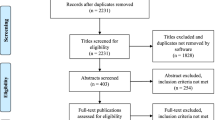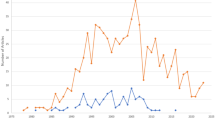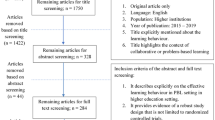Abstract
Problem-based learning (PBL) has been identified as an approach that improves the training of nurses by teaching them how to apply theory to clinical practice and by developing their problem-solving skills, which could be used to overcome environmental constraints within clinical practice. A consensus is emerging that there is a need for systematic reviews and meta-analyses regarding a range of selected topics in nursing education. The purpose of this study was to conduct a meta-analysis of the available literature in order to synthesize the effects of PBL in nursing education. Using a number of databases, we identified studies related to the effectiveness of PBL in nursing. An analysis was conducted on a range of outcome variables, including overall effect sizes and effects of evidence and evaluation levels, learning environment, and study characteristics. We found that the effect of PBL in nursing education is 0.70 standard deviations (medium-to-large effect size). We also found that PBL has positive effects on the outcome domains of satisfaction with training, clinical education, and skill course. These results may act as a guide for nurse educators with regard to the conditions under which PBL is more effective than traditional learning strategies.


Similar content being viewed by others
References
*Article include in the meta-analysis
Albanese, M. (2000). Problem-based learning: Why curricula are likely to show little effect on knowledge and clinical skills. Medical Education, 34, 729–738.
Albanese, M. A., & Mitchell, S. (1993). Problem-based learning: A review of literature on its outcomes and implementation issues. Academic Medicine, 68(1), 52–81.
*Applin, H., Williams, B., Day, R., & Buro, K. A. (2011). Comparison of competencies between problem-based learning and non-problem-based graduate nurses. Nurse Education Today, 31(2), 129–134.
*Arthur, D. (2001). The effects of the problem-based alcohol early intervention education package on the knowledge and attitudes of students of nursing. The Journal of Nursing Education, 40(2), 63–72.
Azman, A., & Ustu¨n, B. (2005). A study to determine student nurses’ conflict resolution skill. In Paper presented at the 2nd active education congress at Izmir
Barrows, H. S. (1986). A taxonomy of problem-based learning methods. Medical Education, 20(6), 481–486.
Barrows, H. S. (1996). Problem-based learning in medicine and beyond: A brief overview. New Directions for Teaching and Learning, 68, 3–12.
Barrows, H. S. (2002). Is it truly possible to have such a thing as d PBL? Distance Education, 23(1), 191–122.
Barrows, H. S., & Tamblyn, R. M. (1980). Problem-based learning: An approach to medical education. New York: Springer.
Beachey, W. D. (2007). A comparison of problem-based learning and traditional curricula in baccalaureate respiratory therapy education. Respiratory Care, 52(11), 1497–1506.
Belland, B. R., French, B. F., & Ertmer, P. A. (2009). Validity and problem-based learning research: A review of instruments used to assess intended learning outcomes. Interdisciplinary Journal of Problem-based Learning, 3, 59–89.
Borenstein, M., Hedges, L. V., Higgins, J. P. T., & Rothstein, H. R. (2009). Introduction to meta-analysis. West Sussex, UK: Wiley.
Bowers, B., & McCarthy, D. (1993). Developing analytical thinking skills in early undergraduate education. The Journal of Nursing Education, 32(3), 107–114.
Carey, L., & Whittaker, K. A. (2002). Experiences of problem-based learning: Issues for community specialist practitioner students. Nurse Education Today, 22, 661–668.
Chan, Z. C. (2012). Role-playing in the problem-based learning class. Nurse Education Practice, 12(1), 21–27.
Cohen, J. (1988). Statistical power analysis for the behavioral sciences. Hillsdale, NJ: Lawrence Earlbaum Associates.
Cooke, M., & Moyle, K. (2002). Students’ evaluation of problem-based learning. Nurse Education Today, 22(4), 330–339.
Cooper, H. M. (1989). Integrating research: A guide for literature. London: Sage Publications.
Cooper, H., & Hedges, L. (1994). Research synthesis as a scientific enterprise. In H. Cooper & L. V. Hedges (Eds.), The handbook of research synthesis (pp. 3–14). New York: Russell Sage Foundation.
Dochy, F., Segers, M., Van den Bossche, P., & Gijbels, D. (2003). Effects of problem-based learning: A meta-analysis. Learning & Instruction, 13(5), 533–568.
Dolmans, D. H., & Schmidt, H. G. (2006). What do we know about cognitive and motivational effects of small group tutorials in problem-based learning? Advanced Health Science Education Theory Practice, 11(4), 321–336.
Elbaum, B., Vaughn, S., Hughes, M., & Moody, S. (2000). How effective are one to one tutoring programs in reading for elementary students at risk for reading failure? A meta-analysis of the intervention studies. Journal of Educational Psychology, 92(4), 605–619.
Engel, C. E. (1997). Not just a method but a way of learning. In D. Boud & G. Feletti (Eds.), The challenge of problem based learning. London: Kogan Page.
Forbes, H., Duke, M., & Prosser, M. (2001). Students’ perceptions of learning outcomes from group-based, problem-based teaching and learning activities. Advances in Health Sciences Education, 6(3), 205–217.
Fraser, S. W., & Greenhalgh, T. (2001). Coping with complexity: Educating for capability. BMJ, 323(7316), 799–803.
Gaberson, K. B., & Oerman, M. H. (2010). Clinical teaching strategies in nursing. NY: Springer.
Goodnough, K. (2006). Enhancing pedagogical content knowledge through self-study: An exploration of problem-based learning. Teaching in Higher Education, 11(3), 301–318.
Hedges, L. V., & Olkin, I. (1985). Statistical methods for meta-analysis. Orlando, FL: Academic Press.
Hedges, L. V., & Vevea, J. L. (1998). Fixed and random effects models in meta-analysis. Psychological Methods, 3, 486–504.
Hoffman, K., Hosokawa, M., Blake, R., Jr, Headrick, L., & Johnson, G. (2006). Problem-based learning outcomes: Ten years of experience at the University of Missouri-Columbia School of Medicine. Academic Medicine, 81(7), 617–625.
Hwang, S. Y., & Jang, K. S. (2005). Perception about problem-based learning in reflective journals among undergraduate nursing students. Taehan Kanho Hakhoe Chi, 35(1), 65–76.
Ishida, D. N. (1995). Learning preferences among ethnically diverse nursing students exposed to a variety of collaborative learning approaches including problem-based learning. Dissertation, University of Hawaii.
Javid, M. A. (1998). Comparison between the effects of lecturing and problem based learning (PBL) on nursing students. Iran Mag Education Medical Sciences, 50, 35–42.
Johnson, J. L. (1991). Nursing science: Basic, applied, or practical? Implications for the art of nursing. Advances in Nursing Science, 14(1), 7–16.
Kiehl, E. M., & Wink, D. M. (2000). Nusing students as change agents and problem solvers in the community: Community-based nursing education in practice. Nursing and Health Care Perspectives, 21(6), 293–297.
Kim, S. A., Kang, I. A., Kim, S., Nam, K. A., & Park, J. H. (2000). Development of a problem-based learning program in nursing education curriculum. Journal of Korean Psychiatric Nursing, 9(4), 559–570.
Kirkpatrick, D. L., & Kirkpatrick, J. D. (2007). Implementing the four levels. CA: Berrette-Koehler Publisher.
Light, R., & Pillemer, D. (1984). Summing up: The science of reviewing research. Cambridge: Harvard University Press.
Lyons, E. (2008). Examining the effects of problem-based learning and NCLEX-RN scores on critical thinking skills of associate degree nursing students in a southeastern community college. International Journal of Nursing Education Scholarship, 5(1), 21.
*Mathews, L. M. (2011). Problem-based learning and knowledge transfer in a vocational nursing program. (Ph.D., Capella University). ProQuest Dissertations and Theses, (878541064).
McParland, M., Noble, L. M., & Livingston, G. (2004). The effectiveness of problem-based learning compared to traditional teaching in undergraduate psychiatry. Medical Education, 38(8), 859–867.
Mennin, S. P., Friedman, M., Skipper, B., Kalishman, S., & Snyder, J. (1993). Performances on the NMBE I, II, III by medical students in the problem-based learning and conventional tracks at the University of New Mexico. Academic Medicine, 68(8), 616–624.
Mennin, S. P., Kalishman, S., Friedman, M., Pathak, D., & Snyder, J. (1996). A survey of graduates in practice from the University of New Mexico’s conventional and community-oriented problem based tracks. Academic Medicine, 71(10), 1079–1089.
Murphy, J. I. (2004). Using focused reflection and articulation to promote clinical reasoning: An evidence-based teaching strategy. Nursing Education Perspectives, 25, 226–231.
Newman, M., & The Pilot Review Group. (2003). A pilot systematic review and meta-analysis on the effectiveness of problem based learning. Newcastle: Learning and Teaching Subject Network for Medicine, Dentistry and Veterinary Medicine.
Oermann, M. H. (2007). Approaches to gathering evidence for educational practices in nursing. Journal of Continuing Education in Nursing, 38, 250–257.
Oermann, M. H., & Gaberson, K. B. (2009). Evaluation and testing in nursing education. NY: Spring Publishing Company.
Rideout, E. (1998). The experience of learning and teaching in a non-conventional nursing curriculum. Dissertation, University of Toronto.
*Rideout, E., England-Oxford, V., Brown, B., Fothergill-Bourbonnais, F., Ingram, C., Benson, G., et al. (2002). A comparison of problem-based and conventional curricula in nursing education. Advances in Health Sciences Education, 7(1), 3–17.
Rogers, A., Karlsen, S., & Addington-Hall, J. (2000). All the services were excellent. It is when the human element comes in that things go wrong: Dissatisfaction with hospital care in the last year of life. Journal of Advanced Nursing, 31(4), 768–774.
Rothgeb, M. (2008). Creating a nursing simulation laboratory: A literature review. Journal of Nursing Education, 47(11), 489–494.
*Sangestani, G., & Khatiban, M. (2012). Comparison of problem-based learning and lecture-based learning in midwifery. Nurse Education Today (in press). doi:10.1016/j.nedt.2012.03.010.
Santos-gomez, L., Kalishman, S., Rezler, A., Skipper, B., & Mennin, S. P. (1990). Residency performance of graduates from a problem-based and a conventional curriculum. Medical Education, 24(4), 366–375.
Sirin, S. R. (2005). Socioeconomic status and academic achievement: A meta-analytic review of research. Review of Educational Research, 75(3), 417–453.
Smith, I., & Coleman, V. (2008). Student nurse transition from traditional to problem-based learning. Learning in Health & Social Care, 7(2), 114–123.
Sportsman, S., Bolton, C., Bradshaw, P., Close, D., Lee, M., Townley, N., et al. (2009). A regional simulation center partnership: Collaboration to improve staff and student competency. Journal of Continuing Education in Nursing, 40(2), 67–73.
Stern, P. (1997). Student perceptions of a problem based learning course. The American Journal of Occupational Therapy, 51(7), 589–596.
Strobel, J., & van Barneveld, A. (2009). When is PBL more effective? A meta-synthesis of meta-analyses comparing PBL to conventional classrooms. The Interdisciplinary Journal of Problem-Based Learning, 3(1), 44–58.
Tavakol, M., Dennick, R., & Tavakol, S. (2009). A descriptive study of medical educators’ views of problem-based learning. BMC Medical Education, 9(66), 1–8.
*Tiwari, A., Lai, P., So, M., & Yuen, K. (2006). A comparison of the effects of problem-based learning and lecturing on the development of students’ critical thinking. Medical Education, 40(6), 547–554.
Vernon, D. T., & Blake, R. L. (1993). Does problem-based learning work? A meta-analysis of evaluative research. Academic Medicine, 68(7), 550–563.
Walker, A., & Leary, H. (2009). A problem based learning meta analysis: Differences across problem types, implementation types, disciplines, and assessment levels. The Interdisciplinary Journal of Problem-based Learning, 3(1), 6–28.
White, M. J., Amos, E., & Kouzekanani, K. (1999). Problem based learning: An outcomes study. Nurse Educator, 24(2), 33–36.
Williams, S. M., & Beattie, H. J. (2008). Problem based learning in a clinical setting: A systematic review. Nurse Education Today, 28(2), 146–154.
Further references included in the meta-analysis
Alkhasawneh, I. M., Mrayyan, M. T., Docherty, C., Alashram, S., & Yousef, H. Y. (2008). Problem-based learning (PBL): Assessing students’ learning preferences using VARK. Nurse Education Today, 28(5), 572–579.
Arpanantikul, M., Thanooruk, R., & Chanpuelksa, P. (2006). Self-directed learning readiness, critical thinking skill, and self esteem in nursing students studying through problem based learning. Thai Journal of Nursing Research, 10(1), 59–72.
Baker, C. M., Pesut, D. J., McDaniel, A. M., & Fisher, M. L. (2007). Evaluating the impact of problem-based learning on learning styles of master’s students in nursing administration. Journal of Professional Nursing: Official Journal of the American Association of Colleges of Nursing, 23(4), 214–219.
Docherty, C., Hoy, D., Topp, H., & Trinder, K. (2005). eLearning techniques supporting problem based learning in clinical simulation. International Journal of Medical Informatics, 74(7–8), 527–533.
Goelen, G., De Clercq, G., Huyghens, L., & Kerckhofs, E. (2006). Measuring the effect of interprofessional problem-based learning on the attitudes of undergraduate health care students. Medical Education, 40(6), 555–561.
Hwang, S. Y., & Kim, M. J. (2006). A comparison of problem-based learning and lecture-based learning in an adult health nursing course. Nurse Education Today, 26(4), 315–321.
Liaw, S. Y., Chen, F. G., Klainin, P., Brammer, J., O’Brien, A., & Samarasekera, D. D. (2010). Developing clinical competency in crisis event management: An integrated simulation problem-based learning activity. Advances in Health Sciences Education: Theory and Practice, 15(3), 403–413.
Melo, K., Williams, B., & Ross, C. (2010). The impact of nursing curricula on clinical practice anxiety. Nurse Education Today, 30(8), 773–778.
Nango, E., & Tanaka, Y. (2010). Problem-based learning in a multidisciplinary group enhances clinical decision making by medical students: A randomized controlled trial. Journal of Medical and Dental Sciences, 57(1), 109–118.
Ozturk, C., Muslu, G. K., & Dicle, A. (2008). A comparison of problem-based and traditional education on nursing students’ critical thinking dispositions. Nurse Education Today, 28(5), 627–632.
Seren, S., & Ustun, B. (2008). Conflict resolution skills of nursing students in problem-based compared to conventional curricula. Nurse Education Today, 28(4), 393–400.
Siu, H. M., Laschinger, H. K., & Vingilis, E. (2005). The effect of problem-based learning on nursing students’ perceptions of empowerment. The Journal of Nursing Education, 44(10), 459–469.
Szogedi, I., Zrinyi, M., Betlehem, J., Ujvarine, A. S., & Toth, H. (2010). Training nurses for CPR: Support for the problem-based approach. European Journal of Cardiovascular Nursing: Journal of the Working Group on Cardiovascular Nursing of the European Society of Cardiology, 9(1), 50–56.
Tiwari, A., Chan, S., Wong, E., Wong, D., Chui, C., Wong, A., et al. (2006). The effect of problem-based learning on students’ approaches to learning in the context of clinical nursing education. Nurse Education Today, 26(5), 430–438.
Tseng, H. C., Chou, F. H., Wang, H. H., Ko, H. K., Jian, S. Y., & Weng, W. C. (2011). The effectiveness of problem-based learning and concept mapping among taiwanese registered nursing students. Nurse Education Today, 31(8), e41–e46.
Williams, B. (2004). Self direction in a problem based learning program. Nurse Education Today, 24(4), 277–285.
Acknowledgments
This study was supported by the Basic Science Research Program through the National Research Foundation of Korea (NRF) funded by the Ministry of Education, Science and Technology (2009-0068463).
Author information
Authors and Affiliations
Corresponding author
Rights and permissions
About this article
Cite this article
Shin, IS., Kim, JH. The effect of problem-based learning in nursing education: a meta-analysis. Adv in Health Sci Educ 18, 1103–1120 (2013). https://doi.org/10.1007/s10459-012-9436-2
Received:
Accepted:
Published:
Issue Date:
DOI: https://doi.org/10.1007/s10459-012-9436-2




